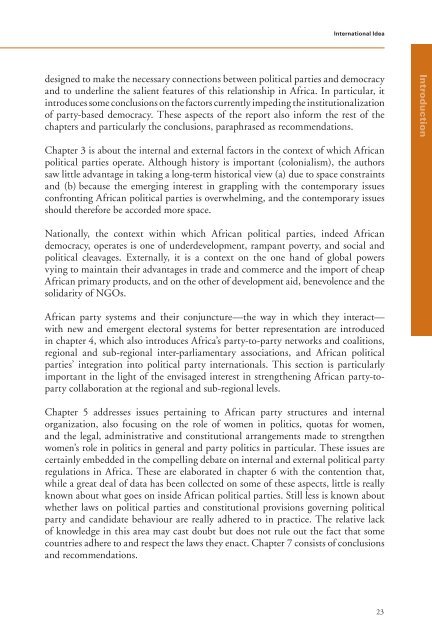Political Parties in Africa: Challenges for Sustained Multiparty
Political Parties in Africa: Challenges for Sustained Multiparty
Political Parties in Africa: Challenges for Sustained Multiparty
Create successful ePaper yourself
Turn your PDF publications into a flip-book with our unique Google optimized e-Paper software.
International Idea<br />
designed to make the necessary connections between political parties and democracy<br />
and to underl<strong>in</strong>e the salient features of this relationship <strong>in</strong> <strong>Africa</strong>. In particular, it<br />
<strong>in</strong>troduces some conclusions on the factors currently imped<strong>in</strong>g the <strong>in</strong>stitutionalization<br />
of party-based democracy. These aspects of the report also <strong>in</strong><strong>for</strong>m the rest of the<br />
chapters and particularly the conclusions, paraphrased as recommendations.<br />
Chapter 3 is about the <strong>in</strong>ternal and external factors <strong>in</strong> the context of which <strong>Africa</strong>n<br />
political parties operate. Although history is important (colonialism), the authors<br />
saw little advantage <strong>in</strong> tak<strong>in</strong>g a long-term historical view (a) due to space constra<strong>in</strong>ts<br />
and (b) because the emerg<strong>in</strong>g <strong>in</strong>terest <strong>in</strong> grappl<strong>in</strong>g with the contemporary issues<br />
confront<strong>in</strong>g <strong>Africa</strong>n political parties is overwhelm<strong>in</strong>g, and the contemporary issues<br />
should there<strong>for</strong>e be accorded more space.<br />
Nationally, the context with<strong>in</strong> which <strong>Africa</strong>n political parties, <strong>in</strong>deed <strong>Africa</strong>n<br />
democracy, operates is one of underdevelopment, rampant poverty, and social and<br />
political cleavages. Externally, it is a context on the one hand of global powers<br />
vy<strong>in</strong>g to ma<strong>in</strong>ta<strong>in</strong> their advantages <strong>in</strong> trade and commerce and the import of cheap<br />
<strong>Africa</strong>n primary products, and on the other of development aid, benevolence and the<br />
solidarity of NGOs.<br />
<strong>Africa</strong>n party systems and their conjuncture—the way <strong>in</strong> which they <strong>in</strong>teract—<br />
with new and emergent electoral systems <strong>for</strong> better representation are <strong>in</strong>troduced<br />
<strong>in</strong> chapter 4, which also <strong>in</strong>troduces <strong>Africa</strong>’s party-to-party networks and coalitions,<br />
regional and sub-regional <strong>in</strong>ter-parliamentary associations, and <strong>Africa</strong>n political<br />
parties’ <strong>in</strong>tegration <strong>in</strong>to political party <strong>in</strong>ternationals. This section is particularly<br />
important <strong>in</strong> the light of the envisaged <strong>in</strong>terest <strong>in</strong> strengthen<strong>in</strong>g <strong>Africa</strong>n party-toparty<br />
collaboration at the regional and sub-regional levels.<br />
Chapter 5 addresses issues perta<strong>in</strong><strong>in</strong>g to <strong>Africa</strong>n party structures and <strong>in</strong>ternal<br />
organization, also focus<strong>in</strong>g on the role of women <strong>in</strong> politics, quotas <strong>for</strong> women,<br />
and the legal, adm<strong>in</strong>istrative and constitutional arrangements made to strengthen<br />
women’s role <strong>in</strong> politics <strong>in</strong> general and party politics <strong>in</strong> particular. These issues are<br />
certa<strong>in</strong>ly embedded <strong>in</strong> the compell<strong>in</strong>g debate on <strong>in</strong>ternal and external political party<br />
regulations <strong>in</strong> <strong>Africa</strong>. These are elaborated <strong>in</strong> chapter 6 with the contention that,<br />
while a great deal of data has been collected on some of these aspects, little is really<br />
known about what goes on <strong>in</strong>side <strong>Africa</strong>n political parties. Still less is known about<br />
whether laws on political parties and constitutional provisions govern<strong>in</strong>g political<br />
party and candidate behaviour are really adhered to <strong>in</strong> practice. The relative lack<br />
of knowledge <strong>in</strong> this area may cast doubt but does not rule out the fact that some<br />
countries adhere to and respect the laws they enact. Chapter 7 consists of conclusions<br />
and recommendations.<br />
Introduction
















